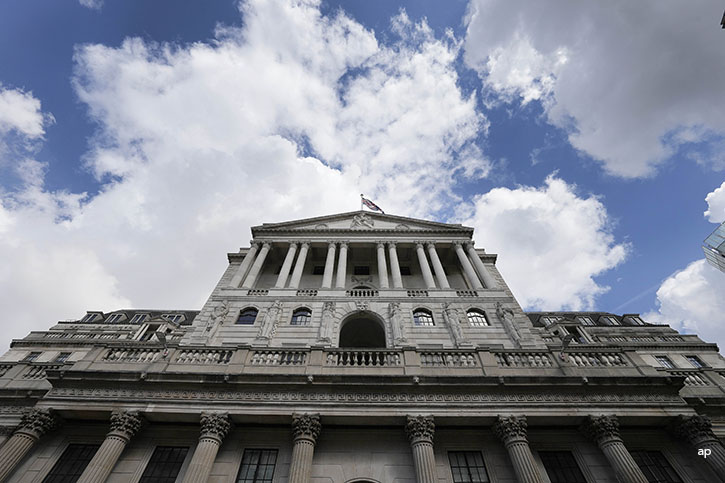
While the Bank of England is still expected to cut interest rates this Thursday, last week’s eventful Budget has shifted forecasts for monetary policy heading into 2025.
According to FactSet consensus, interest rates are still forecast to fall from 5% to 4.75% on Thursday, following the Bank of England’s next Monetary Policy Committee meeting.
This would be the second rate cut in the UK loosening cycle. Other European central banks such as the ECB, SNB and Swedish Riksbank have already reduced rates multiple times already this year.
Labour’s first Budget last Wednesday contained a raft of tax-raising measures as expected, but bond markets reacted negatively the day after on news of higher government debt. Gilt yields have increased sharply since Oct. 30, increasing UK government borrowing costs.
Markets are now assuming that heightened government spending may be inflationary, forcing the Bank of England to slow the expected path of rate cuts. This comes after a dramatic reduction in headline CPI from over 11% to below 2%, the official target level, after a tightening in monetary policy from 0.1% to 5.25% over two years.
How Many Rate Cuts Will There be in 2025?
After this week’s meeting, the Bank’s final monetary policy decision before the end of the year is on Dec. 19, with the first of 2025 occurring on Feb. 6. After a cut this week, the Bank is likely to settle in to a quarterly rate-cutting cadence, says Steve Matthews, Investment Director, Liquidity at Canada Life Asset Management, in a note.
“This pause will allow the Bank of England time to assess the economic impact of increased government borrowing announced in the Budget.
“Markets have already tempered expectations, [and are] now forecasting two or three rate cuts in 2025, down from earlier projections of four or five.”
Daniela Sabin Hathorn, senior market analyst at Capital.com, notes the Bank’s progress in bringing inflation down, while adding that the outlook for future cuts remains uncertain.
“The BoE is now expected to cut rates less aggressively than the Fed and the ECB,” she adds in a note.
At the same time, the Bank’s approach has so far been “gradualist”, with the latest Budget measures likely to enforce this caution rather than knock the central bank of course. That’s the view of Peter Goves, Head of Developed Market Debt Sovereign Research at MFS Investment Management, in a note published on Nov. 4.
Will UK Inflation Now Rise Again?
The Bank of England meeting this week involves an element of catch-up; there was no monetary policy meeting in October, so the last official announcement was on Sep. 19, when interest rates were held.
At the September meeting, the Bank said “a gradual approach to removing policy restraint remains appropriate”—a mantra that is likely to be repeated on Thursday.
Since September we’ve had the Budget on Oct. 30 and a weaker-than-expected inflation reading for September, in data released on Oct. 16.
In that October release, the Office for National Statistics said CPI increased by 1.7% year on year, against forecasts for a 1.9% rise. Data for October will be released on Nov. 20, when CPI is forecast to have risen by 2.2%.
Among many other economic forecasts by the Office for Budget Responsibility unveiled at the Budget, inflation predictions stood out.
Not only were these higher than the March 2024 report, which was produced for the last Conservative Budget, they were higher because of the “direct and indirect impact” of the chancellor’s plans. Average CPI for 2025 is now expected to be 2.6%, compared to forecast for 1.5% just eight months ago. Inflation remains above target in 2026, 2027 and 2028, because of persistent wage growth and fiscal loosening.
UK fiscal and monetary policy is separate because of the Bank of England’s independence from central government, a separation that occurred in 1997. Since then, the government has had no official influence on interest rates.
At the same time, the new government’s fiscal plans will have a direct bearing on the Bank of England’s decisions, as well as its forecasts for economic growth and inflation in the coming years. The November interest rate decision will also be accompanied by the quarterly monetary policy report, where we will hear more detailed analysis of the likely impact of the government’s fiscal path.
Morningstar, Inc. licenses indexes to financial institutions as the tracking indexes for investable products, such as exchange-traded funds, sponsored by the financial institution. The license fee for such use is paid by the sponsoring financial institution based mainly on the total assets of the investable product. A list of investable products that track or have tracked a Morningstar index is available on the resources tab at indexes.morningstar.com. Morningstar, Inc. does not market, sell, or make any representations regarding the advisability of investing in any investable product that tracks a Morningstar index.
























